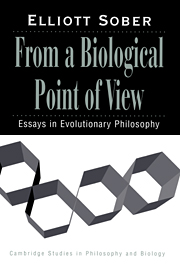Book contents
- Frontmatter
- Contents
- Acknowledgments
- Introduction
- 1 Did evolution make us psychological egoists?
- 2 Why not solipsism?
- 3 The adaptive advantage of learning and a priori prejudice
- 4 The primacy of truth-telling and the evolution of lying
- 5 Prospects for an evolutionary ethics
- 6 Contrastive empiricism
- 7 Let's razor Ockham's razor
- 8 The principle of the common cause
- 9 Explanatory presupposition
- 10 Apportioning causal responsibility
- 11 Evolution, population thinking, and essentialism
- 12 Temporally oriented laws
- Index
12 - Temporally oriented laws
Published online by Cambridge University Press: 14 January 2010
- Frontmatter
- Contents
- Acknowledgments
- Introduction
- 1 Did evolution make us psychological egoists?
- 2 Why not solipsism?
- 3 The adaptive advantage of learning and a priori prejudice
- 4 The primacy of truth-telling and the evolution of lying
- 5 Prospects for an evolutionary ethics
- 6 Contrastive empiricism
- 7 Let's razor Ockham's razor
- 8 The principle of the common cause
- 9 Explanatory presupposition
- 10 Apportioning causal responsibility
- 11 Evolution, population thinking, and essentialism
- 12 Temporally oriented laws
- Index
Summary
THE PROBLEM
Much has been written about laws that say that some quantity increases with time in the evolution of systems of a certain type. The second law of thermodynamics is the most famous example. Such laws are said to embed an asymmetry between earlier and later. In this paper, I want to discuss a rather different property of laws. Laws can allow us to calculate the future from the past or the past from the future. Laws that do one of these but not the other I will call temporally oriented.
The strict second law is not temporally oriented. If I observe the present entropy of a closed system, I can infer that the entropy will be no less in the future and that it was no greater in the past. A law that posits a monotonic increase (or nondecrease) in a quantity permits inference in both directions.
Non-probabilistic laws that describe a conditional relationship between earlier and later are not temporally oriented. A law of the form ‘If the system is in state E at an earlier time, then it will be in state L at a later time’ supports inferences in both directions. A glimmer of the asymmetry we seek is to be found in the idea of conditional probability.
- Type
- Chapter
- Information
- From a Biological Point of ViewEssays in Evolutionary Philosophy, pp. 233 - 252Publisher: Cambridge University PressPrint publication year: 1994
- 2
- Cited by



